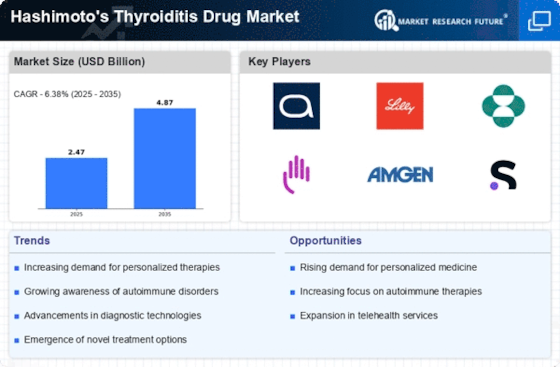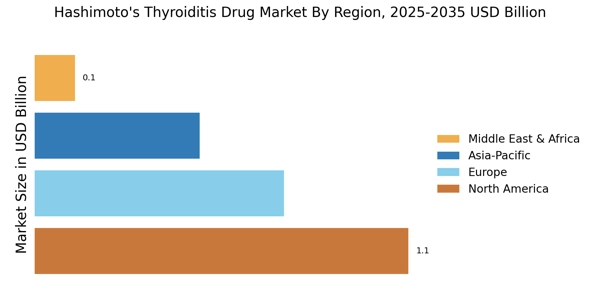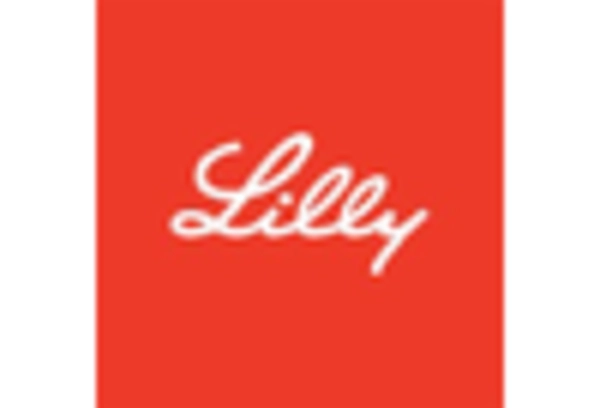Innovations in Drug Development
The Hashimoto's Thyroiditis Drug Market is witnessing a surge in innovative drug development, which serves as a significant market driver. Pharmaceutical companies are increasingly investing in research and development to create novel therapies that target the underlying mechanisms of Hashimoto's. Recent advancements in biologics and targeted therapies have shown promise in improving patient outcomes. For instance, the introduction of new formulations and delivery methods may enhance drug efficacy and patient adherence. This focus on innovation not only addresses unmet medical needs but also stimulates competition among manufacturers, potentially leading to a broader range of treatment options within the Hashimoto's Thyroiditis Drug Market.
Regulatory Support for New Therapies
Regulatory bodies are playing a vital role in shaping the Hashimoto's Thyroiditis Drug Market by facilitating the approval of new therapies. Recent initiatives aimed at expediting the review process for innovative treatments are likely to enhance market dynamics. By streamlining regulatory pathways, agencies encourage pharmaceutical companies to invest in the development of novel drugs for Hashimoto's. This supportive environment not only accelerates the availability of new therapies but also fosters competition among manufacturers. As a result, the Hashimoto's Thyroiditis Drug Market may experience an influx of new treatment options, ultimately benefiting patients seeking effective management of their condition.
Rising Interest in Personalized Medicine
The trend towards personalized medicine is emerging as a crucial driver for the Hashimoto's Thyroiditis Drug Market. Tailoring treatment plans to individual patient profiles, including genetic and environmental factors, may enhance therapeutic efficacy. As research continues to uncover the complexities of Hashimoto's, healthcare providers are increasingly adopting personalized approaches to treatment. This shift not only improves patient outcomes but also fosters a more targeted market for drug manufacturers. The Hashimoto's Thyroiditis Drug Market could see a rise in demand for therapies that align with personalized treatment paradigms, reflecting a broader trend in healthcare towards individualized care.
Growing Awareness and Education Initiatives
The Hashimoto's Thyroiditis Drug Market is significantly influenced by increasing awareness and education initiatives surrounding thyroid health. Healthcare organizations and patient advocacy groups are actively promoting information about Hashimoto's, its symptoms, and treatment options. This heightened awareness encourages individuals to seek medical advice and undergo testing, resulting in more diagnoses. As patients become more informed about their condition, they are more likely to pursue effective treatment options, thereby driving demand within the Hashimoto's Thyroiditis Drug Market. Furthermore, educational campaigns can empower patients to engage in their treatment plans, potentially improving adherence to prescribed therapies.
Increasing Prevalence of Hashimoto's Thyroiditis
The rising incidence of Hashimoto's Thyroiditis is a pivotal driver for the Hashimoto's Thyroiditis Drug Market. Recent estimates suggest that approximately 14 million individuals are affected by this autoimmune disorder, with a notable increase in diagnoses over the past decade. This growing patient population necessitates effective treatment options, thereby propelling demand for pharmaceutical interventions. As awareness of thyroid disorders expands, healthcare providers are more frequently screening for Hashimoto's, leading to earlier detection and treatment. Consequently, the Hashimoto's Thyroiditis Drug Market is likely to experience substantial growth as more patients seek therapeutic solutions to manage their condition.

















